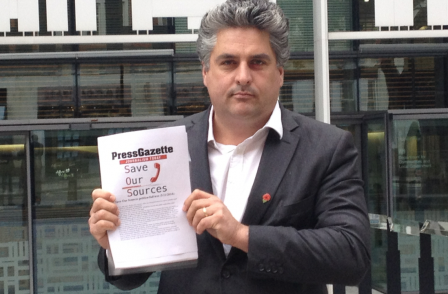
Journalists across Europe held events yesterday to mark European Federation of Journalists' Stand Up For Journalism day.
So it seemed like a particularly apt moment to deliver the Save Our Sources petition to the Interception of Communications Commissioner's Office.
Press Gazette has published more than 70 articles as part of the Save Our Sources campaign – and the issues raised have been widely aired in the rest of the media. Yet, amazingly, some people in positions of powers still don't don't seem to understand what is at stake.
ACPO lead on serious and organised crime, chief constable Mick Creedon, told MPs earlier this week: "I struggle to quite understand what the debate is".
And last month Baroness Williams, speaking for the Government in the House of Lords, appeared to deny that there was any problem at all saying that police requests for communications data are subject to "the most stringent systems anywhere".
 Fortunately, these individuals are now in the minority. And having delivered the Press Gazette petition in person to head of the Interception of Communications Commissioner's Office Joanna Cavan I am certain that her office is aware of the huge concerns about police spying on journalists and the issues at stake.
Fortunately, these individuals are now in the minority. And having delivered the Press Gazette petition in person to head of the Interception of Communications Commissioner's Office Joanna Cavan I am certain that her office is aware of the huge concerns about police spying on journalists and the issues at stake.
The IOCCO is currently carrying out an inquiry into police use of the Regulation of Investigatory Powers Act against journalists. It will report by the end of January and then it will be up to the Government to act.
Some 1,250 Press Gazette readers have signed the Save Our Sources petition and more than 300 have given their own reasons about why they are alarmed about police use of RIPA against journalists.
I have yet to meet a single journalist, or non journalist, of any political persuasion who thinks it is a good thing for the police to be able to secretly view the phone records of law-abiding journalists and their sources.
Here is a copy of the letter which I submitted to Interception Commissioner Sir Paul Kennedy along with the 1,250 names on the petition, and the dossier of comments provided by petitioners.
Dear Sir Paul Kennedy,
I would like to invite you to read Press Gazette’s Save Our Sources coverage which is all available here: snipurl.com/saveoursources
We believe use of RIPA against The Sun and Tom Newton Dunn in particular, and by Suffolk Police against Mark Bulstrode in 2006 (snipurl.com/bulstrode), were clear breaches of their Article 10 rights.
Neither the journalists nor the sources had broken the law.
In the case of Kent Police and the Mail on Sunday in 2012, neither of the two journalists targeted by RIPA requests were under suspicion of having broken the law. Yet their telecoms records were evidenced and the source exposed.
We would argue that Constance Briscoe’s offence, of misleading the police, was not sufficiently serious to warrant undermining the confidence that all potential whistleblowers and sources will have in contacting newspapers and journalists in future.
By undermining the sanctity and confidentiality of whistleblowers and sources we make it more likely that scandals will go unreported in the future.
The Rotherham child abuse scandal, the Mid Staffs NHS Trust scandal, MPs’ expenses and phone-hacking were all exposed with the help of public sector whistleblowers
I sincerely believe that if we do not do all we can to protect the confidentiality of such sources we will be severely undermining our democracy and our free society.
According to HMIC, UK police forces conducted 302 leak inquiries in the five years to the Leveson Inqury (2011/2012). We believe RIPA telecoms requests may have been made in many of these cases.
We would argue that a public employee contacting a journalist through unofficial channels may be a disciplinary matter, but it is not a criminal one (particularly if no money has changed hands).
Again we would argue that it is clear breach of Article 10.
I do hope your investigation will establish how many times police have used RIPA against journalists and news organisations in order to identify confidential sources. And I hope you will also weigh the public interest considerations under Article 10, which as you know gives the highest protection to confidential communications between journalists and their sources.
Yours sincerely,
Dominic Ponsford, editor
Press Gazette
John Carpenter House, John Carpenter Street, London, EC4Y 0AN.
Email pged@pressgazette.co.uk to point out mistakes, provide story tips or send in a letter for publication on our "Letters Page" blog
